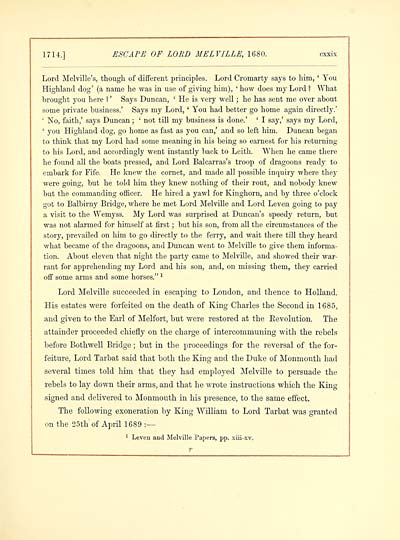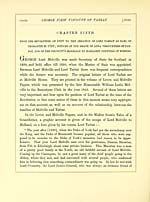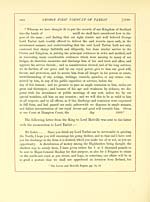Earls of Cromartie > [NSLBLANK]
(175)
Download files
Complete book:
Individual page:
Thumbnail gallery: Grid view | List view

1714.] ESCAPE OF LORD MELVILLE, 1680. cxxix
Lord Melville's, though of different principles. Lord Cromarty says to him, ' You
Highland dog' (a name he was in use of giving him), 'how does my Lord 1 What
brought you here 1 ' Says Duncan, ' He is very well ; he has sent me over about
some private business.' Says my Lord, ' You had better go home again directly.'
' No, faith,' says Duncan ; ' not till my business is done.' ' I say,' says my Lord,
' you Highland dog, go home as fast as you can,' and so left him. Duncan began
to think that my Lord had some meaning in his being so earnest for his returning
to his Lord, and accordingly went instantly back to Leith. When he came there
he found all the boats pressed, and Lord Balcarras's troop of dragoons ready to
embark for Fife. He knew the cornet, and made all possible inquiry where they
were going, but he told him they knew nothing of their rout, and nobody knew
but the commanding officer. He hired a yawl for Kinghorn, and by three o'clock
got to Balbirny Bridge, where he met Lord Melville and Lord Leven going to pay
a visit to the Wemyss. My Lord was surprised at Duncan's speedy return, but
was not alarmed for himself at first ; but his son, from all the circumstances of the
story, prevailed on him to go directly to the ferry, and wait there till they heard
what became of the dragoons, and Duncan went to Melville to give them informa-
tion. About eleven that night the party came to Melville, and showed their war-
rant for apprehending my Lord and his son, and, on missing them, they carried
off some arms and some horses." 1
Lord Melville succeeded in escaping to London, and thence to Holland.
His estates were forfeited on the death of King Charles the Second in 1685,
and given to the Earl of Melfort, but were restored at the Eevolution. The
attainder proceeded chiefly on the charge of intercommuning with the rebels
before Bothwell Bridge ; but in the proceedings for the reversal of the for-
feiture, Lord Tarbat said that both the King and the Duke of Monmouth had
several times told him that they had employed Melville to persuade the
rebels to lay down their arms, and that he wrote instructions which the King
signed and delivered to Monmouth in his presence, to the same effect.
The following exoneration by King William to Lord Tarbat was granted
on the 25th' of April 1689 :—
1 Leven and Melville Papers, pp. xiii-xv.
r
Lord Melville's, though of different principles. Lord Cromarty says to him, ' You
Highland dog' (a name he was in use of giving him), 'how does my Lord 1 What
brought you here 1 ' Says Duncan, ' He is very well ; he has sent me over about
some private business.' Says my Lord, ' You had better go home again directly.'
' No, faith,' says Duncan ; ' not till my business is done.' ' I say,' says my Lord,
' you Highland dog, go home as fast as you can,' and so left him. Duncan began
to think that my Lord had some meaning in his being so earnest for his returning
to his Lord, and accordingly went instantly back to Leith. When he came there
he found all the boats pressed, and Lord Balcarras's troop of dragoons ready to
embark for Fife. He knew the cornet, and made all possible inquiry where they
were going, but he told him they knew nothing of their rout, and nobody knew
but the commanding officer. He hired a yawl for Kinghorn, and by three o'clock
got to Balbirny Bridge, where he met Lord Melville and Lord Leven going to pay
a visit to the Wemyss. My Lord was surprised at Duncan's speedy return, but
was not alarmed for himself at first ; but his son, from all the circumstances of the
story, prevailed on him to go directly to the ferry, and wait there till they heard
what became of the dragoons, and Duncan went to Melville to give them informa-
tion. About eleven that night the party came to Melville, and showed their war-
rant for apprehending my Lord and his son, and, on missing them, they carried
off some arms and some horses." 1
Lord Melville succeeded in escaping to London, and thence to Holland.
His estates were forfeited on the death of King Charles the Second in 1685,
and given to the Earl of Melfort, but were restored at the Eevolution. The
attainder proceeded chiefly on the charge of intercommuning with the rebels
before Bothwell Bridge ; but in the proceedings for the reversal of the for-
feiture, Lord Tarbat said that both the King and the Duke of Monmouth had
several times told him that they had employed Melville to persuade the
rebels to lay down their arms, and that he wrote instructions which the King
signed and delivered to Monmouth in his presence, to the same effect.
The following exoneration by King William to Lord Tarbat was granted
on the 25th' of April 1689 :—
1 Leven and Melville Papers, pp. xiii-xv.
r
Set display mode to:
![]() Universal Viewer |
Universal Viewer | ![]() Mirador |
Large image | Transcription
Mirador |
Large image | Transcription
Images and transcriptions on this page, including medium image downloads, may be used under the Creative Commons Attribution 4.0 International Licence unless otherwise stated. ![]()
| Histories of Scottish families > Earls of Cromartie > [NSLBLANK] > (175) |
|---|
| Permanent URL | https://digital.nls.uk/96759392 |
|---|
| Attribution and copyright: |
|
|---|---|
| Description | A selection of almost 400 printed items relating to the history of Scottish families, mostly dating from the 19th and early 20th centuries. Includes memoirs, genealogies and clan histories, with a few produced by emigrant families. The earliest family history goes back to AD 916. |
|---|

